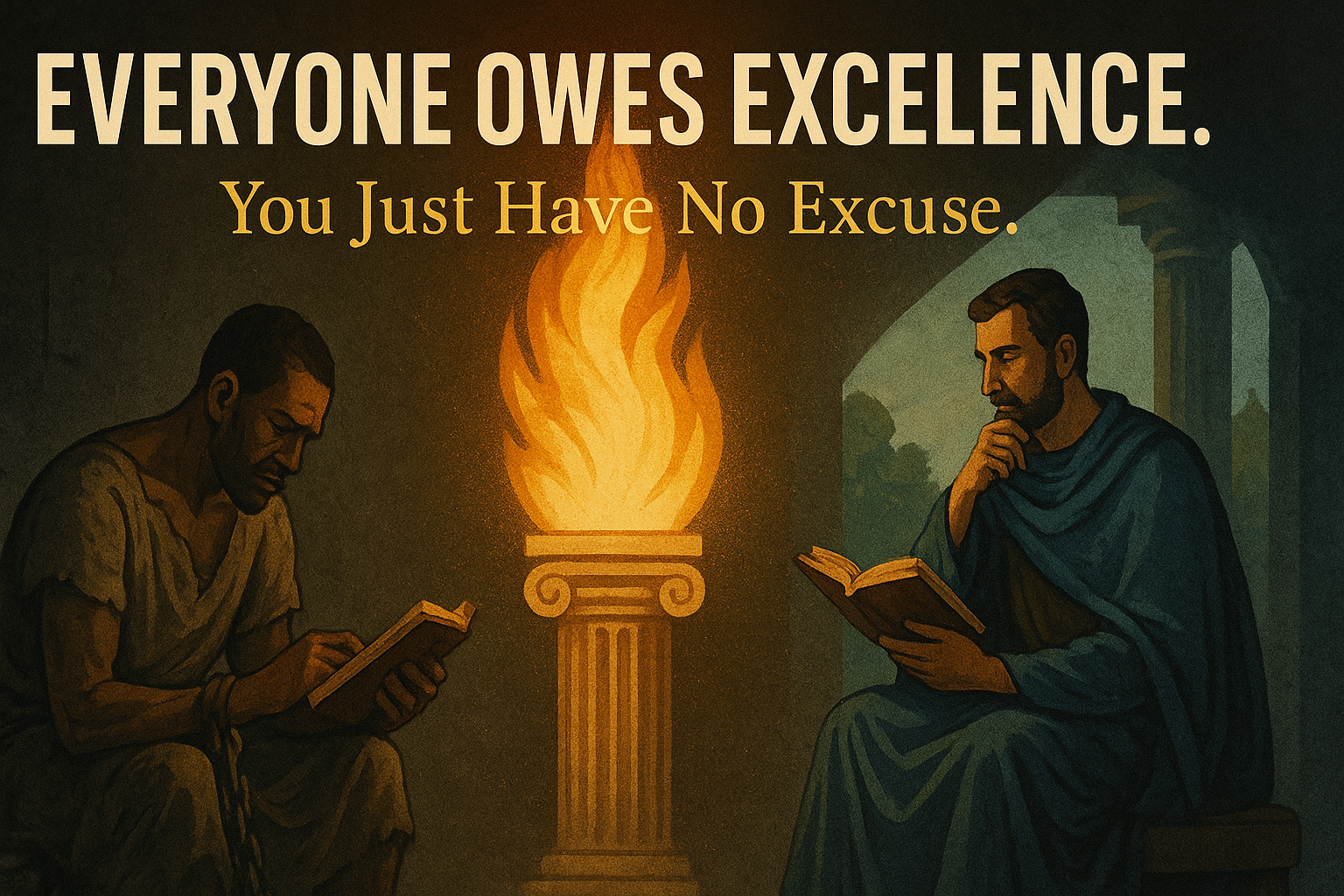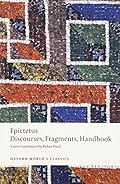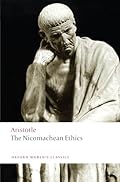
Everyone Owes Excellence. You Just Have No Excuse.
By Derek Neighbors on November 5, 2025
I was 18 years old, dropped out of college, married with an infant, and I knew exactly what I wanted: to be a motorcycle mechanic and build custom bikes. That’s what freedom looked like, the right to choose what I wanted.
My dad sat me down for a conversation I didn’t want to have.
“You’re built for so much more.”
Not said meanly. Not controlling. Just naming something I didn’t want to acknowledge.
So, I worked three jobs while going to back to school full-time with a wife and infant at home. My parents loaned us money for a down payment on our first house, we repaid it when we sold a few years later. I got a job in technology. Quit the other three jobs. Eventually started my first company with another young man. Off to the races.
Years later, I can see what was really happening in that conversation with my dad.
He wasn’t saying I owed him a debt. He was saying I’d run out of excuses.
The Assumption I Lived By
At 18, I believed I had freedom, so I could do whatever I wanted. I’d worked hard in high school. I got into college. If I wanted to drop out and build motorcycles, that was my right. My choice. My freedom.
The culture reinforced this: “Follow your passion.” “You earned the right to choose.” “Do what makes you happy.”
And it felt true. I had made my own decisions. Got married. Had a child. Dropped out. Those were my choices. Shouldn’t I get to choose what came next?
But I couldn’t see that I was raised in an upper middle class family who valued learning and education. I never longed for anything. I was told anything was possible. They invested in my future. The freedom to choose felt like mine because I’d never been without it.
What My Dad Was Actually Saying
My dad didn’t tell me what to do. He said I needed to do what was right for me. But then came those words: “You’re built for so much more.”
He wasn’t talking about money or status. He was naming something I was avoiding: I had every advantage, every resource, every opportunity. And I was about to use them for my preference instead of my potential.
Years of education. Resources. Opportunities. Safety nets. He and others had built capacity in me. Not to create a debt. To eliminate my excuses.
The Person Who Changed Everything
Here’s what hit me years later when I actually studied philosophy:
Epictetus was a slave. Property. Crippled by his master. Had nothing. No freedom, no resources, no safety net, no choices.
And he chose philosophy. He pursued arete (excellence) with nothing but his mind and his will.
I had everything. And I was choosing motorcycles.
My dad wasn’t saying “you owe us.” He was saying “everyone owes excellence to themselves. You just have zero excuse not to pursue it.”
Marcus Aurelius had absolute power. Could do anything. He chose duty, discipline, philosophy.
Epictetus was a slave. Could do almost nothing. He chose the exact same thing.
The slave and the emperor owed the same pursuit of arete. The only difference: Marcus had no excuse based on lack of resources. Epictetus had no excuse based on lack of freedom.
And I had no excuse based on either.
The Universal Obligation
Everyone with a rational soul owes the pursuit of excellence. Not as inspiration. As fact.
The Greeks didn’t debate this. They stated it as reality. arete is the obligation of every human being, regardless of circumstances. Aristotle taught that actualizing your rational capacity is what makes you human. Not pursuing it isn’t just unfortunate. It’s tragic. You’re wasting your humanity.
The Stoics were even more direct. Everyone, slave or free, rich or poor, powerful or powerless, owes the same dedication to virtue. External circumstances are adiaphora (indifferent). What matters is what you do with your will.
Not complicated. Not debatable. Just true.
Everyone owes excellence.
The person grinding without advantages owes it. The person with every advantage owes it. The slave owes it. The emperor owes it.
The difference isn’t the obligation. It’s the excuses available.
What Advantages Actually Do
My advantages didn’t create an obligation I wouldn’t otherwise have. They removed every excuse for not fulfilling the universal obligation everyone has.
Can’t pursue education because you have to work three jobs? I worked three jobs AND went to school. That excuse doesn’t fly.
Can’t take risks because you have no safety net? I had one. So that excuse is gone too.
Can’t build something because you lack resources? I had them. Excuse eliminated.
Can’t pursue excellence because of circumstances? Epictetus was a slave. That excuse just evaporated.
Every advantage I had removed one more excuse from the list of reasons I could give for not pursuing arete.
And when you run out of excuses, you’re left with a choice: pursue excellence or admit you’re choosing mediocrity.
The Harder Truth About Others
Here’s where it gets uncomfortable for a different reason:
The person without advantages still owes excellence. Not to me. Not to anyone else. To themselves. To their own rational nature. To their own capacity for virtue.
Epictetus proved it’s possible. Frankl proved it in the concentration camps. Countless others have proved it in circumstances far worse than anything I’ll ever face.
The person grinding without a safety net, without education, without resources, without opportunities, they still owe themselves the pursuit of excellence. Maybe they have a better claim to arete than I do because they have to forge it through pure character, not assisted by favorable circumstances.
But I can’t use their circumstances as my excuse. That’s patronizing to them and cowardly for me.
They’re pursuing excellence despite their circumstances. What’s my excuse with mine?
What This Actually Means
Excellence isn’t optional for anyone. It’s the universal human obligation. Everyone owes it to themselves.
Your circumstances determine:
- What form your excellence takes
- What obstacles you face
- What resources you have
- What excuses you can claim
But they don’t determine whether you owe it. Everyone does.
If you have advantages, you have fewer excuses. That’s it. The obligation was already there. The advantages just removed your ability to hide behind circumstances.
The Questions That Strip the Excuses
Before any major choice, ask:
- Am I pursuing excellence or choosing comfort?
- What excuses am I using that my circumstances eliminate?
- Epictetus was a slave. What’s my excuse?
- Am I avoiding the universal obligation everyone has, or am I fulfilling it?
The Reckoning
List every significant advantage you’ve had:
- Family resources
- Educational access
- Safety nets
- Professional networks
- Second chances
- Freedom to fail without catastrophic consequences
Now here’s the hard question: What excuses do these advantages eliminate?
“I can’t afford to pursue education” - eliminated if you got education. “I can’t take risks without a safety net” - eliminated if you had one. “I can’t build something without resources” - eliminated if you had them.
Now the brutal part: Are you pursuing excellence or just cycling through excuses?
Final Thoughts: The Universal Standard
Everyone owes excellence. Slave or emperor. Poor or wealthy. Advantaged or disadvantaged.
Epictetus owed it. Marcus owed it. You owe it. I owe it.
The difference isn’t the obligation. It’s whether you have excuses left to hide behind.
I had advantages. Lots of them. They didn’t create my obligation to pursue arete. I already owed that to myself, to my rational nature, to my capacity for virtue.
The advantages just stripped away every excuse I could use for not pursuing it.
I can’t claim lack of education. I got it. I can’t claim lack of resources. I had them. I can’t claim lack of safety net. It was there. I can’t claim adverse circumstances prevented excellence. Epictetus was a slave and still chose philosophy.
So what’s left?
Either pursue excellence or admit I’m choosing mediocrity with no excuse.
The person grinding without advantages still owes themselves excellence. They’re pursuing it anyway. Many of them are forging arete through pure character while I was born with resources.
I just have zero excuse not to.
Marcus Aurelius wrote:
Waste no more time arguing what a good man should be. Be one.
He knew. The obligation is universal. The excuses are contingent on circumstances. Excellence is owed regardless.
Stop asking “What do I want?” Start asking “What do I owe myself?”
The answer is arete. Excellence. Becoming the best version of your rational self.
Not because of advantages. Because you’re human.
The advantages just mean you can’t claim circumstances prevented it.
You can keep choosing comfortable mediocrity. Keep cycling through excuses. Keep burying your capacity in the safety of comfort.
But understand what that is: violence against your own rational nature. Betrayal of your humanity. The person who has capacity and refuses to use it isn’t just failing. They’re committing a kind of murder against who they could become.
Everyone owes excellence. You just ran out of excuses for avoiding it.
I know I had so much privilege and opportunity and gifts given to me along the way. I am grateful for every one of them. But that’s not why I refused to squander them.
I refused to squander them because everyone owes themselves the pursuit of excellence. I just couldn’t claim circumstances prevented me.
Epictetus was a slave and chose philosophy.
What’s your excuse?
MasteryLab provides the framework and accountability for people who recognize the universal obligation to excellence and are done cycling through excuses.
Everyone owes excellence. What’s your excuse for avoiding it?




